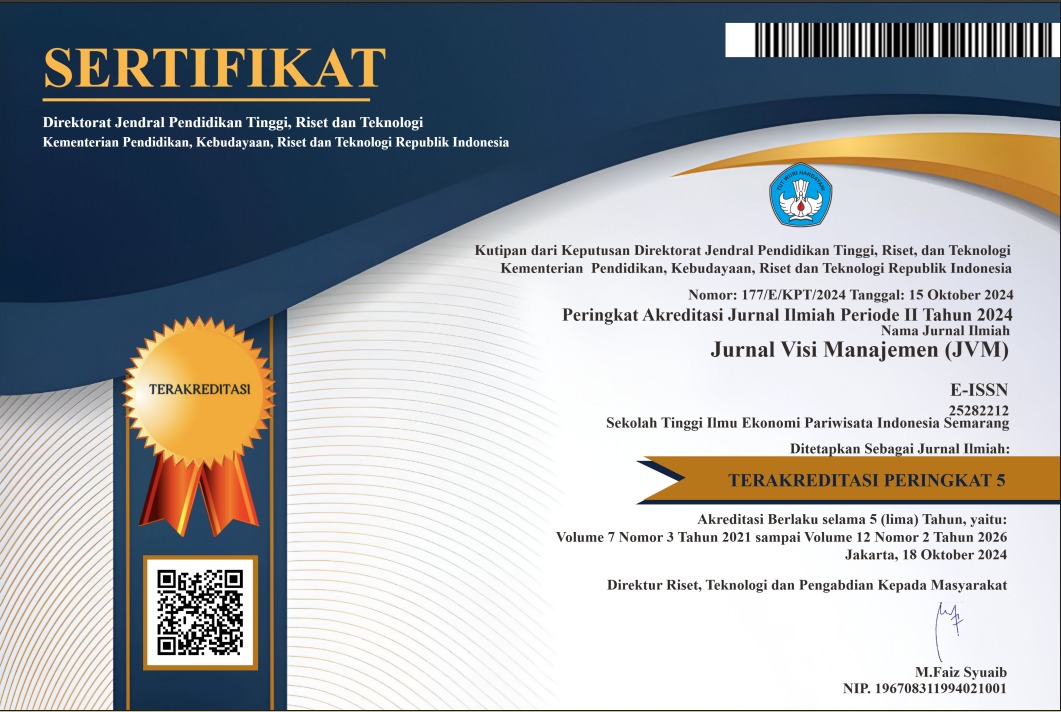Pembatasan Pekerjaan Dan Dampaknya Pada Karyawan Dengan Keterbatasan Opsi Karier
DOI:
https://doi.org/10.56910/jvm.v11i1.598Keywords:
Job restrictions, Low bargaining power, Employee performance, Employee income, Corporate resource protectionAbstract
This study aims to explore the impact of job restrictions on employees with limited career options and the challenges faced by companies in addressing these issues. Using a qualitative literature review, the study found that job restrictions, such as non-compete agreements, can negatively impact employees with limited career options. These impacts include reduced job mobility, career stagnation, and lower income. However, companies can mitigate these effects by implementing fair and transparent policies and providing adequate support to employees. This research highlights the need for balancing corporate resource protection with employee career development to maintain long-term productivity and organizational sustainability.
References
Arnow-Richman, R. S., Carlson, G., Lobel, O., Roginsky, J., Short, J. L., & Starr, E. (2022). Supporting market accountability, workplace equity, and fair competition by reining in non-disclosure agreements. Day One Project. Retrieved from htps://fas.org/ publication/supporting-market-accountability-workplace-equity-and-fair-competition-by-reining-in-non-disclosure-agreements/
Balan, D. J. (2021). Labor noncompete agreements: Tool for economic efficiency or means to extract value from workers? The Antitrust Bulletin, 66(4), 593–608.
Barney, J. (1991). Firm resources and sustained competitive advantage. Journal of Management, 17(1), 99–120.
Bishara, N. D. (2011). Fifty ways to leave your employer: Relative enforcement of noncompete agreements, trends, and implications for employee mobility policy. University of Pennsylvania Journal of Business Law, 13, 751–795.
Bishara, N. D., Martin, K. J., & Thomas, R. S. (2015). An empirical analysis of noncompetition clauses and other restrictive postemployment covenants. Vanderbilt Law Review, 68, 1.
Coff, R. W. (1997). Human assets and management dilemmas: Coping with hazards on the road to resource-based theory. Academy of Management Review, 22(2), 374–402.
Colvin, A., & Shierholz, H. (2019). Noncompete agreements: Ubiquitous, harmful to wages and to competition, and part of a growing trend of employers requiring employees to sign away their rights. Economic Policy Institute, 57. Retrieved from https://www.epi.org/publication/noncompete-agreements/
Dixon-Woods, M., Agarwal, S., Jones, D., Young, B., & Sutton, A. (2006). Synthesising qualitative and quantitative evidence: A review of possible methods. Journal of Health Services Research & Policy, 11(1), 45–53.
Friedman, D. (1991). Non-competition agreements: Some alternative explanations. Mimeo.
Gamboa, L. F., & Orozco, A. A. (2020). Contractual limitations on mobility and innovation in high-tech industries: Evidence from noncompete clauses. Strategic Management Journal, 41(12), 2241–2263.
Ganco, M., Ziedonis, R. H., & Agarwal, R. (2015). More stars stay, but the brightest ones still leave: Job hopping in the shadow of patent enforcement. Strategic Management Journal, 36(5), 659–685.
Kini, O., Williams, R., & Yin, D. (2020). CEO noncompete agreements, job risk, and compensation. Review of Financial Studies, 34, hhaa103.
Marx, M., Strumsky, D., & Fleming, L. (2009). Mobility, skills, and the Michigan non-compete experiment. Management Science, 55(6), 875–889.
Starr, E. (2019a). The use, abuse, and enforceability of non-compete and no-poach agreements: A brief review of the theory, evidence, and recent reform efforts. Economic Innovation Group.
Starr, E. (2019b). Consider this: Training, wages, and the enforceability of covenants not to compete. ILR Review, 72(4), 783–817.
Starr, E. (2021). Non-compete agreements and their impact on innovation and labor mobility: A review of the literature. Journal of Economic Perspectives, 35(2), 87–112.
Starr, E., Balasubramanian, N., & Yamaguchi, S. (2021). Employment restrictions and earnings: Evidence from worker mobility. Strategic Management Journal, 42(7), 1319–1337.
Starr, E., Prescott, J. J., & Bishara, N. (2021). Noncompetes in the US labor force. Journal of Law and Economics, 64, 53–84.
Tranfield, D., Denyer, D., & Smart, P. (2003). Towards a methodology for developing evidence-informed management knowledge by means of systematic review. British Journal of Management, 14(3), 207–222.







